-
 Limited internet briefly returns in Iran after protest blackout
Limited internet briefly returns in Iran after protest blackout
-
South Africa declares national disaster as floods batter region

-
 Gang members in Guatemala kill seven police after prison crackdown: minister
Gang members in Guatemala kill seven police after prison crackdown: minister
-
Villa's title bid rocked by Everton loss, Newcastle held at Wolves

-
 Dybala boosts Roma's Champions League hopes, Fiorentina honour Commisso
Dybala boosts Roma's Champions League hopes, Fiorentina honour Commisso
-
Villa's title bid rocked by Everton loss, Newcastle held by Wolves

-
 'Avatar: Fire and Ash' at number one in N.America for fifth straight week
'Avatar: Fire and Ash' at number one in N.America for fifth straight week
-
Limited internet returns in Iran after protest blackout

-
 Syria's leader agrees truce deal with Kurds after govt troops advance
Syria's leader agrees truce deal with Kurds after govt troops advance
-
Smith's penalty sees Quins eliminate La Rochelle, Bordeaux secure top seeding

-
 Atletico edge Alaves to strengthen Liga top-four hold
Atletico edge Alaves to strengthen Liga top-four hold
-
Uganda president says opposition 'terrorists' in victory speech

-
 New Zealand register first ODI series win in India despite Kohli ton
New Zealand register first ODI series win in India despite Kohli ton
-
Elvira wins Dubai Invitational after Lowry's last hole meltdown

-
 Jeong snatches Union late draw at Stuttgart in Bundesliga
Jeong snatches Union late draw at Stuttgart in Bundesliga
-
Man Utd's Martinez hits back at Scholes after height jibes

-
 Frank on the brink as Romero calls for unity amid Spurs 'disaster'
Frank on the brink as Romero calls for unity amid Spurs 'disaster'
-
Chile declares emergency as wildfires kill at least 15

-
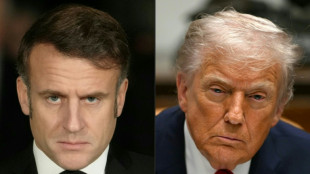 Europe hits back at Trump tariff threat over Greenland
Europe hits back at Trump tariff threat over Greenland
-
Men's Fashion Week in Paris: what to watch

-
 McGrath goes top of slalom standings with Wengen win
McGrath goes top of slalom standings with Wengen win
-
No Venus fairytale as Alcaraz, Sabalenka win Melbourne openers

-
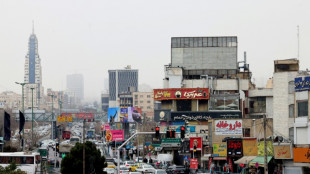 Iran considers 'gradually' restoring internet after shutdown
Iran considers 'gradually' restoring internet after shutdown
-
Mitchell, Phillips tons guide New Zealand to 337-8 in ODI decider

-
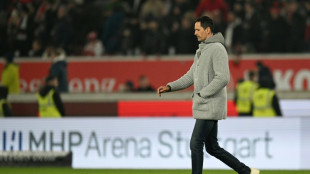 Flailing Frankfurt sack coach Toppmoeller
Flailing Frankfurt sack coach Toppmoeller
-
Kurdish forces withdraw from Syria's largest oil field as govt forces advance
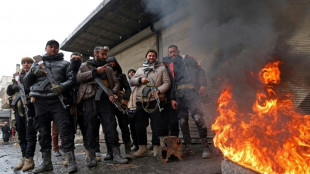
-
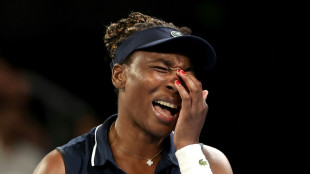 'Proud' Venus Williams, 45, exits Australian Open after epic battle
'Proud' Venus Williams, 45, exits Australian Open after epic battle
-
Vonn in Olympic form with another World Cup podium in Tarvisio super-G

-
 Alcaraz kicks off career Grand Slam bid with tough Australian Open test
Alcaraz kicks off career Grand Slam bid with tough Australian Open test
-
Hosts Morocco face Mane's Senegal for AFCON glory

-
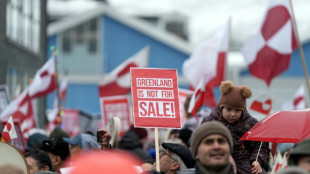 Europe scrambles to respond to Trump tariff threat
Europe scrambles to respond to Trump tariff threat
-
Venus Williams, 45, exits Australian Open after epic battle
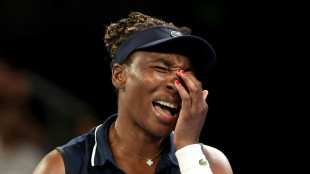
-
 Taiwan's Lin wins India Open marred by 'dirty' conditions
Taiwan's Lin wins India Open marred by 'dirty' conditions
-
Indonesia rescuers find body from plane crash

-
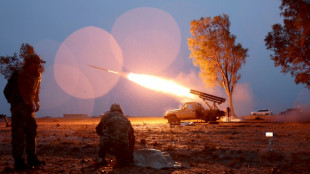 Kurdish-led forces withdraw from Syria's largest oil field: monitor
Kurdish-led forces withdraw from Syria's largest oil field: monitor
-
Ball girl collapses in Australian Open heat as players rush to help

-
 France's Moutet booed for underarm match point serve in Melbourne
France's Moutet booed for underarm match point serve in Melbourne
-
Zverev happy with response after wobble in opening Melbourne win

-
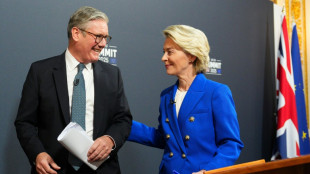 'Bring it on': UK's Labour readies for EU reset fight
'Bring it on': UK's Labour readies for EU reset fight
-
New Zealand's Wollaston wins again to lead Tour Down Under

-
 Zverev wobbles but wins at Australian Open as Alcaraz enters fray
Zverev wobbles but wins at Australian Open as Alcaraz enters fray
-
British qualifier upsets 20th seed Cobolli to make mum proud

-
 Zverev drops set on way to Australian Open second round
Zverev drops set on way to Australian Open second round
-
Indonesian rescuers find debris from missing plane

-
 Wembanyama scores 39 as Spurs overcome Edwards, Wolves in thriller
Wembanyama scores 39 as Spurs overcome Edwards, Wolves in thriller
-
Heartbreak for Allen as Broncos beat Bills in playoff thriller

-
 British qualifier upsets 20th seed Cobolli in Melbourne
British qualifier upsets 20th seed Cobolli in Melbourne
-
Paolini races into round two to kickstart Australian Open

-
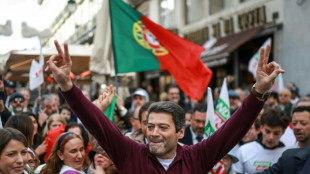 Portugal presidential vote wide open as far-right surge expected
Portugal presidential vote wide open as far-right surge expected
-
Lutz kicks Broncos to overtime thriller as Bills, Allen fall short

Trump’s 50% tariffs on europe
In a move that has sent shockwaves through global markets, U.S. President Donald Trump has threatened to impose 50% tariffs on imports from the European Union, initially set for June 1, 2025, but later delayed to July 9 to allow for negotiations. This aggressive trade policy has sparked intense debate about its motivations and potential consequences for the European economy, which relies heavily on exports to the United States. The proposed tariffs, described as a tool to reshape global trade dynamics, raise questions about the strategic intent behind such a drastic measure and its implications for transatlantic relations.
The European Union, a key trading partner of the United States, exported goods worth billions to the U.S. in 2024, with sectors like pharmaceuticals, automotive, and luxury goods leading the charge. A 50% tariff would significantly increase the cost of these goods, potentially reducing demand and squeezing profit margins for European companies. For instance, Germany’s automotive industry, including brands like BMW and Porsche, faces heightened risks, as does France’s luxury sector, which employs over 600,000 people. Italy’s high-end leather goods and the European aerospace sector, exemplified by companies like Airbus, could also face severe disruptions. The European Commission has estimated that such tariffs could shave 0.5% off the EU’s GDP, a substantial blow to an economy already grappling with global uncertainties.
Trump’s rationale appears rooted in a long-standing belief that tariffs are a solution to perceived trade imbalances. He has publicly expressed frustration with the EU, accusing it of being “very difficult to deal with” and slow to negotiate. His administration argues that the EU benefits disproportionately from trade with the U.S., a claim that resonates with his domestic base but overlooks the mutual benefits of transatlantic commerce. The president’s strategy seems to leverage tariffs as a negotiating tactic, pressuring the EU to concede to terms more favourable to U.S. interests, such as increased purchases of American goods like soya beans, arms, and liquefied natural gas. The delay to July 9, following a phone call with European Commission President Ursula von der Leyen, suggests a willingness to negotiate, but the threat of tariffs remains a powerful bargaining chip.
Critics argue that Trump’s approach is less about economic fairness and more about political posturing. By targeting the EU, he reinforces a narrative of protecting American jobs and manufacturing, a cornerstone of his economic agenda. His recent announcement to double steel tariffs to 50% and impose 25% tariffs on autos underscores this focus on domestic industry. However, the broader economic fallout could be severe. European officials, including Germany’s Lars Klingbeil, have warned that such a trade conflict harms both sides, endangering jobs and economic stability. The EU has signalled readiness to retaliate with counter-tariffs, potentially targeting U.S. products like Boeing aircraft, which could escalate tensions into a full-blown trade war.
The timing of the tariff threat adds to its disruptive potential. Europe’s economy, while showing resilience in some areas—Germany’s GDP grew unexpectedly in early 2025 due to strong exports—is not immune to external shocks. The uncertainty surrounding Trump’s tariffs has already rattled markets, with European stocks tumbling after the initial announcement before recovering slightly upon the delay. Companies like HP, which cited tariff-related costs as a factor in cutting earnings forecasts, illustrate the ripple effects on global supply chains. Small businesses and consumers, particularly in the U.S., could face higher prices, while European exporters risk losing market share if forced to absorb tariff costs.
Trump’s tariff strategy also faces legal challenges. A U.S. trade court recently ruled that his use of emergency powers to impose tariffs was unlawful, though an appeals court temporarily reinstated them. This legal uncertainty complicates the administration’s plans, yet Trump’s team has hinted at alternative mechanisms, such as invoking a 1930 trade law to bypass judicial rulings. These manoeuvres reflect a determination to press forward, regardless of opposition, aligning with Trump’s broader goal of reshaping the global economic order.
For the EU, the path forward involves balancing diplomacy with resolve. The European Commission, led by Ursula von der Leyen, has committed to fast-tracking trade talks, with negotiations set to intensify in the coming weeks. EU Trade Commissioner Maroš Šefčovič is expected to engage directly with U.S. counterparts, aiming for a deal that could reduce tariffs to zero on industrial goods. However, the EU remains firm in defending its interests, preparing countermeasures should talks falter. The bloc’s unity will be tested as member states like Italy, with leaders like Giorgia Meloni fostering ties with the White House, push for compromise, while others advocate a harder line.
The stakes are high for both sides. A failure to reach an agreement by July 9 could trigger a tariff regime that disrupts supply chains, inflates consumer prices, and erodes economic confidence. For Trump, the tariffs are a high-stakes gamble to assert U.S. dominance in global trade, but they risk alienating a key ally and destabilising an interconnected economy. For Europe, the challenge is to navigate this turbulent period without sacrificing its economic vitality or succumbing to pressure. As negotiations unfold, the world watches closely, aware that the outcome will shape the future of transatlantic trade and beyond.

Ishiba's Plan to Change Power in Asia

EU: Online platforms to pay tax?

EU: Energy independence achieved!

EU: Record number of births!

EU: Military spending is on the rise!

Crisis: EU bicycle production drops!

EU: Foreign-controlled enterprises?

EU DECODED: Deforestation law’s trade-offs

Underwater Wi-Fi: European startups woo investors

Trump's US support for Ukraine and China?

Cultural year 2024: between Qatar and Morocco




